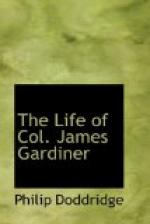“I must take the liberty,” says he, in a letter dated on the first day of the new year, or, according to the old style, Dec. 21, 1719, “to entreat you that you would receive no company on the Lord’s day. I know you have a great many good acquaintance, with whose discourses one might be very well edified; but as you cannot keep out and let in whom you please, the best way, in my humble opinion, will be to see none.” In another, of Jan. 25, “I am happier than any one can imagine, except I could put him exactly in the same situation with myself; which is what the world cannot give, and no man ever attained it, unless it were from above.” In another, dated March 30, which was just before a sacrament day, “To-morrow, if it please God, I shall be happy, my soul being to be fed with the bread of life which came down from heaven. I shall be mindful of you all there.” In another of Jan. 29, he thus expresses that indifference for worldly possessions which he so remarkably carried through the remainder of his life: “I know the rich are only stewards for the poor, and must give an account of every penny; therefore, the less I have, the more easy will it be to give an account of it.” And to add no more from these letters at present, in the conclusion of one of them he has these comprehensive and solemn words: “Now that He, who is the ease of the afflicted, the support of the weak, the wealth of the poor, the teacher of the ignorant, the anchor of the fearful, and the infinite reward of all faithful souls, may pour out upon you all his richest blessings, shall always be the prayer of him who is entirely yours,” &c.
To this account of his correspondence with his excellent mother, I should be glad to add a large view of another, to which she introduced him, with that reverend and valuable person under whose pastoral care she was placed—I mean the justly celebrated Doctor Edmund Calamy, to whom she could not but early communicate the joyful news of her son’s conversion. I am not so happy as to be possessed of the letters which passed between them, which I have reason to believe would make a curious and valuable collection; but I have had the pleasure of receiving from my worthy and amiable friend, the Rev. Mr. Edmund Calamy, one of the letters the doctor, his father, wrote to the major on this wonderful occasion. I perceive by the contents of it that it was the first, and, indeed, it is dated as early as the 3d of August, 1719, which must be but a few days after his own account, dated August 4, N.S., could reach England. There is so much true religion and good sense in this paper, and the counsel it suggests may be so reasonable to other persons in circumstances which bear any resemblance to his, that I make no apology to my reader for inserting a large extract from it.




